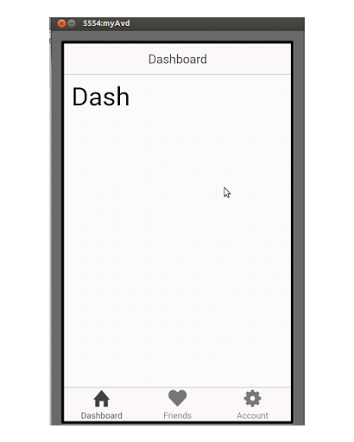一个先进的App框架:使用Ionic创建一个简单的APP
介绍
自Hybrid Mobile技术发展以来,Web开发者转到移动开发的人数大大增加了。
Hybrid Mobile开发技术使得一个Web开发者能够去开发一个运行在多个平台上的移动应用。完全不用去学习相应的平台语言和使用已经存在的技术。
Hybrid Mobile技术已经发展了很多,有很多不同类型的平台存在,比如说 PhoneGap 和 Titanium 。
一个值得考虑的Hybrid Mobile开发新平台就是 Ionic 。
Ionic 是一个先进的HTML5(Hybrid Mobile)技术App框架。它是一个可以使用HTML5来创建一个漂亮的移动应用的前端开源框架。
Ionic的App都是基于 Cordova 的,所以Cordova工具可以 用来构建,部署和测试App。Ionic重点研究App的外观和感觉,它目前使用 AngularJS 来构建一个看起来很棒的前端。
安装
要开始使用Ionic,首先要确保你已经安装了 Node.js 。
然后,根据你所想要开发的App平台,安装所需的 Android 或者 IOS 平台附件。在这篇文章里,我们将试着创建一个Android的App。
再下一步,安装最新版本的Cordova和Ionic,命令行工具如下:
npm install -g cordova ionic 当安装完成时,试着用一个标签模版如下图所示创建一个新的项目:
ionic start myIonicApp tabs 切换到项目目录,添加ionic平台,如下所示建立app和效仿它:
cd myIonicApp ionic platform add android ionic build android ionic emulate android 这是一个默认标签模版的app:

入门
我们将要创建一个简单的 ToDo List 应用程序。让我们使用一个空模版来建立一个简单 的app,这样能够让我们从零开始。如下所示使用一个空模版建立一个新app:
ionic start myToDoList blank 如果你切换到 myToDoList/www 的目录下你可以看到AngularJS的文件。这就是我们将要添 加相关代码的地方,以便于用来创建我们的app。
创建和显示列表
首先,我们需要创建一个列表用来显示“任务列表”。为此我们将利用到 ion-list 命令。如下所示将 ion-list 添加到我们的 www/index.html 中:
<ion-list> <ion-item>Scuba Diving</ion-item> <ion-item>Climb Mount Everest</ion-item> </ion-list> 在添加上述的 ion-list 到 index.html 之后,这里是html中所有的代码的样子:
<!DOCTYPE html> <html> <head> <meta charset="utf-8"> <meta name="viewport" content="initial-scale=1, maximum-scale=1, user-scalable=no, width=device-width"> <title></title> <link href="lib/ionic/css/ionic.css" rel="stylesheet"> <link href="css/style.css" rel="stylesheet"> <!-- IF using Sass (run gulp sass first), then uncomment below and remove the CSS includes above <link href="css/ionic.app.css" rel="stylesheet"> --> <!-- ionic/angularjs js --> <script src="lib/ionic/js/ionic.bundle.js"></script> <!-- cordova script (this will be a 404 during development) --> <script src="cordova.js"></script> <!-- your app's js --> <script src="js/app.js"></script> </head> <body ng-app="starter"> <ion-pane> <ion-header-bar class="bar-stable"> <h1 class="title">My ToDo List</h1> </ion-header-bar> <ion-content> <ion-list> <ion-item>Scuba Diving</ion-item> <ion-item>Climb Mount Everest</ion-item> </ion-list> </ion-content> </ion-pane> </body> </html> 现在,让我们动手来重建和仿真出app来得到这个列表。
就像上面看到的代码,使用 ion-list 我们给我们的任务列表硬编码出2个项目。为了让app的功能更加完善,我们应该能够动态的添加和查看项目列表。
在里面, www/js/ 创建了一个 controllers.js 文件和定义了一个叫做 ToDoListCtrl 新的控制器。这是 controllers.js 文件的样子:
angular.module('starter.controllers', []) .controller('ToDoListCtrl', function ($scope) { }); 在上面的代码中,我们定义了一个新的模块 starter.controller 和一个新的控制器 ToDoListCtrl 。
接下来,我们需要将这个模块添加到我们已经存在的应用中。打开 www/js/app.js 然后将这个模块添加进去。
这是添加了新的 starter.controller 模块之后的app.js代码:
angular.module('starter', ['ionic', 'starter.controllers']) .run(function ($ionicPlatform) { $ionicPlatform.ready(function () { if (window.StatusBar) { StatusBar.styleDefault(); } }); }) 下一步,定义一个 $scope 来支撑任务列表项目。在里面, ToDoListCtrl 声明了一个新的 $scope 变量 toDoListItems ,如下所示:
.controller('ToDoListCtrl', function ($scope) { $scope.toDoListItems = [{ task: 'Scuba Diving', status: 'not done' }, { task: 'Climb Everest', status: 'not done' }] }); 在 index.html 里的 app.js 包含着 controllers.js 。
我们需要将上述的控制器逻辑添加到我们 index.html 里的 ion-list 中,如下图所示修改 ion-list :
<ion-list ng-controller="ToDoListCtrl"> <ion-item ng-repeat="item in toDoListItems"> {{item.task}} </ion-item> </ion-list> 正如你在上述代码中所看到的,我们使用 ng-controller 指令来将控制器添加到 ion-list 中。我们使用了 ng-repeat 指令在 $scope 的变量中反复定义了 toDoListItems 将它展示在列表中。
现在,通过行动来重建app和仿真出你想要做的列表。
在列表中添加项目
接下来,我们需要实现出可以将项目添加到已存在的列表中的一种方式。为此,我们将会利用 ionicModal ,它可以在按钮被点击之后让展开的列表向上滚动起来。
首先在展开的页面的顶部添加一个按钮,以便于给列表添加新的项目。
然后,让我们利用 ion-header-bar 来使我们列表的头部看起来更加富有色彩的。如下所示修改代码:
<ion-header-bar align-title="left" class="bar-positive"> <h1 class="title">My ToDo List</h1> <div class="buttons"> <button class="button" ng-click="openModal()">Add</button> </div> </ion-header-bar> 正如你在上面的代码中所看到的,我们添加了一个类名为 bar-positive 的 ion-header-bar 标签,它可以为列表添加颜色。你可以很多不同类型的头部,请参考 这里 的详细文档。
我们也已经在我们列表的头部的右侧添加了一个名为 Add 的新按钮,它将会调用一个函数来打开一个模式窗口(我们将会立即定义这个模式)。
如下所示在 index.html 中添加一个模式弹出:
<script id="modal.html" type="text/ng-template"> <div class="modal"> <div class="bar bar-header bar-calm"> <button class="button" ng-click="closeModal()">back</button> <h1 class="title">Add Item</h1> </div> <br></br> <br></br> <form ng-submit="AddItem(data)"> <div class="list"> <div class="list list-inset"> <label class="item item-input"> <input type="text" placeholder="ToDo Item" ng-model="data.newItem"> </label> </div> <button class="button button-block button-positive" type="submit"> Add Item </button> </div> </form> </div> </script> 按照上面的代码,我们有一个头部文件在我们的模式集中,一个输入框和一个将新项目添加到任务列表中的添加按钮。
我们在头部文件中有一个返回按钮,我们给它添加了一个 closeModal() 函数来使用 ng-click 来关闭模式。我们使用 ng-submit 给表单添加了一个叫做 AddItem 的函数,当表单 提交的时候将会添加项目到已有的列表中。
现在,我们需要将ionic模式结合到我们的控制器中。我们将 $ionicModal 添加到控制器并定义所需要到的函数,如下所示:
angular.module('starter.controllers', []) .controller('ToDoListCtrl', function ($scope, $ionicModal) { // array list which will contain the items added $scope.toDoListItems = []; //init the modal $ionicModal.fromTemplateUrl('modal.html', { scope: $scope, animation: 'slide-in-up' }).then(function (modal) { $scope.modal = modal; }); // function to open the modal $scope.openModal = function () { $scope.modal.show(); }; // function to close the modal $scope.closeModal = function () { $scope.modal.hide(); }; //Cleanup the modal when we're done with it! $scope.$on('$destroy', function () { $scope.modal.remove(); }); //function to add items to the existing list $scope.AddItem = function (data) { $scope.toDoListItems.push({ task: data.newItem, status: 'not done' }); data.newItem = ''; $scope.closeModal(); }; }); 正如在上述代码中所看到的,我们使用 .fromTemlateUrl 来加载html文本,在给 $scope 定义初始化时定义了两个选项还有当文本加载的时候的动画类型。
我们同样定义了打开,关闭模式的函数,同时还定义了一个向已存在的数组中添加项目的函数。
演示屏幕
我们的实现已经完成,我们已经准备好要运行和仿真我们的app。保存所有文件,重建并且仿真app。我们任务列表的app的两个屏幕应该是这个样子的:

在这里输入图片描述
结束语
在这篇文章里,我们看到了如何从零开始使用Ionic——混合应用程序开发中的一个先进的HTML5框架。我们使用一些Ionic的工具如 ionicModal 和 ion-list 来开发一个简单的基础的任务列表app。
这个app可以扩展出更多的功能, 这里 有详细说明。为了更好的去理解AngularJS,我建议参考 AngularJS文档 。同时上述文章中的代码可以在 GitHub 上得到。
本文根据 @Jay Raj 的《 Building a Simple App Using Ionic, an Advanced Mobile App Framework 》所译,整个译文带有我们自己的理解与思想,如果译得不好或有不对之处还请同行朋友指点。如需转载此译文,需注明英文出处: http://www.sitepoint.com/building-simple-app-using-ionic-advanced-html5-mobile-app-framework/ 。










![[HBLOG]公众号](https://www.liuhaihua.cn/img/qrcode_gzh.jpg)

